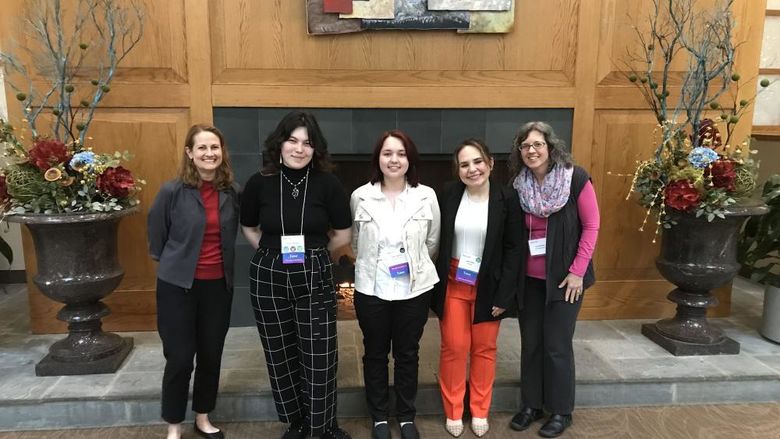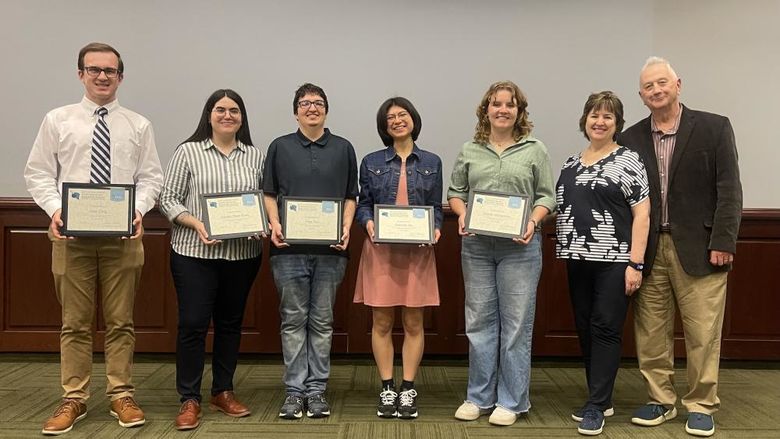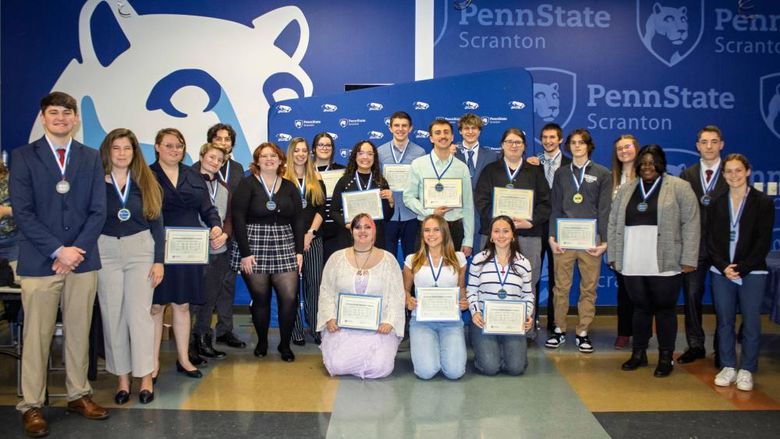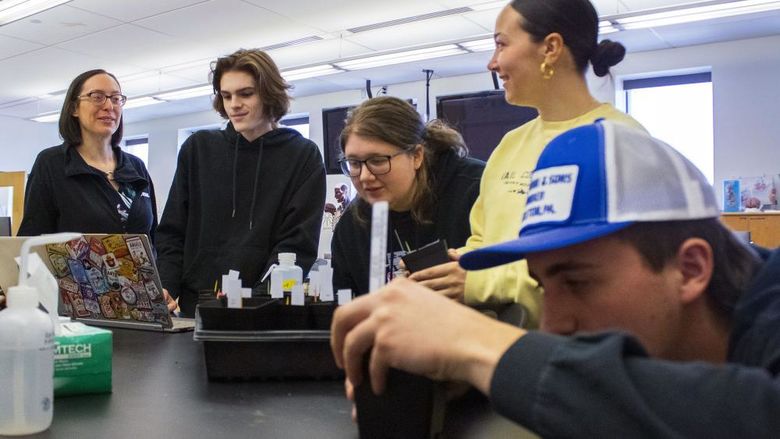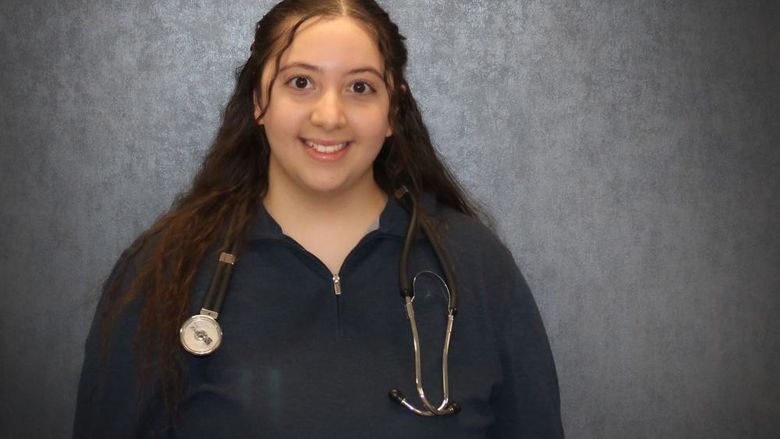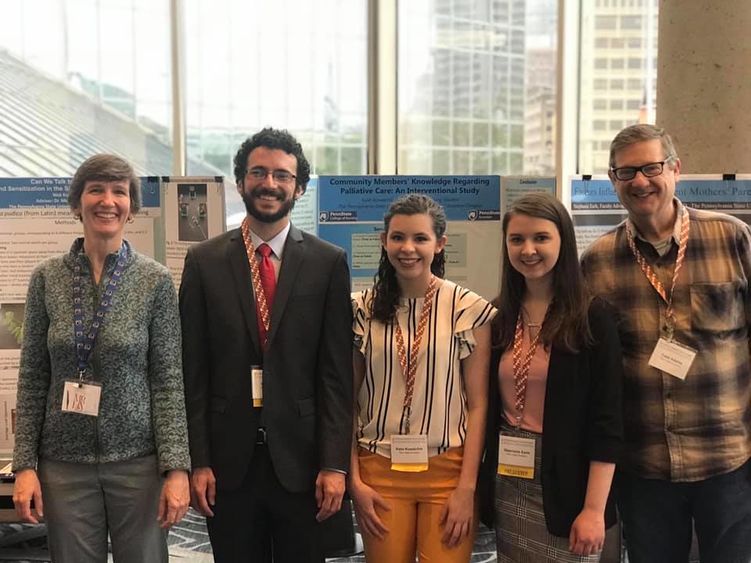
Associate Professor of Biology Meg Hatch; students Nicholas Kremp, Kalei Kowalchik and Stephanie Earle; and Assistant Professor of Philosophy Todd Adams, left to right, pose near the students' research posters, which they presented at the 2019 Northeast Regional Honors Council Conference in Baltimore, Maryland.
DUNMORE, Pa. — Penn State Scranton was well represented last month at the 2019 Northeast Regional Honors Council Conference in Baltimore, Maryland.
Students Nicholas Kremp (senior, biology), Stephanie Earle (senior, psychology), and Kaléi Kowalchik (junior, nursing) presented research posters at the April 11-14 conference. They were accompanied by Michael Evans, assistant chief academic officer and associate teaching professor of nursing, and honors program coordinators Todd Adams, assistant professor of philosophy, and Meg Hatch, associate professor of biology.
“This is a great conference, as it allows honors faculty to network with each other and learn best practices as we strive to enrich the experience for our honors students,” Evans said. “In addition, there are many sessions dedicated just for students that allow them to gain valuable information from their peers and also network with other faculty and peers.”
Meanwhile, the conference offered a host of social activities. Adams particularly enjoyed the conference’s “City as Text” event, which provided students with an immersive, themed exploration of noteworthy Baltimore locales.
“They begin with an expert on the history of Baltimore. Then they have a variety of options for the students to choose among and they go out and explore the city,” Adams said. “This year, they had ‘Defending and Developing American Democracy,’ ‘Arts in Baltimore,’ ‘Struggle for Black Freedom in Baltimore,’ ‘Maritime Power: Military Innovation and the Defense of America,’ ‘Maryland Religious History,’ and ‘Changes in the Urban Landscape.’”
Earle was excited about returning to the conference for the second time.
“It's an interdisciplinary conference, so I love seeing different research from so many different schools,” she said. “The entire conference is a really great opportunity to present my work, as well as a great learning experience. I love seeing what other students are working on and how it relates to my own research interests.”
This year, Earle presented the poster, “Factors Influencing Adolescent Mothers’ Parenting Behaviors.” The literature review analyzed different factors influencing adolescent mothers’ “perceptions of their own parenting abilities and how those perceptions influence behaviors.”
“Higher perceptions of parenting abilities are associated with better parenting behaviors,” she said. “The goal of this research was to be able to create intervention programs that help foster healthy social support and provide young moms with the educational tools they need to increase their confidence in their parenting abilities to allow for the success of both the mother and the child.”
Kremp, who also was making his second conference trip, attended thought-provoking presentations on topics including genetic engineering, climate change denial, and ethnolinguistic nationalism in Eastern Europe.
For his poster, "Can We Talk to Plants? Sensitization in the Shy Plant (Mimosa Pudica),” Kremp attempted to “sensitize” plants and make them fold “in response to particular frequencies of sound by pairing these sounds with minor damage.”
“My hypothesis was that the plants would associate the sounds with the damage and present evidence of sensitization, a simple form of learning, by eventually folding in response to the sound alone,” Kremp said. “I found that none of my plants folded their leaves in response to the sounds alone and no evidence for sensitization was found.”
Kowalchik presented the poster, “Community Members’ Knowledge Regarding Palliative Care: An Interventional Study,” which she also brought to the recent Eastern Nursing Research Society’s 31st Annual Scientific Sessions in Providence, Rhode Island.
For her study, Kowalchik assessed local residents’ familiarity, experience and knowledge of palliative care, a specialized form of medicine focused on providing relief to those with serious illness. Along with Evans and fellow nursing student Kiernan Riley, she created a palliative care teaching intervention for community members. The results showed that the intervention worked in terms of effectively giving test subjects meaningful knowledge on the subject.
One of Hatch’s highlights from the conference was attending a session that featured such disparate topics as “Harnessing the Power and Potential of Climate Science Writing,” “Graffiti’s Call for Social Change,” “#BlackMenMatter: The Impact of Media on Racism and Activism,” and “Rise of the Robots: How Technology Will Actually Kill Us.”
“What I enjoy about the NRHC, in addition to meeting with other honors program directors and coordinators, is that it showcases the students, and there is a wide diversity of projects and presenters,” Hatch said. “The majority of presentations are by students, not faculty, and the topics are as diverse as the presenters.”
